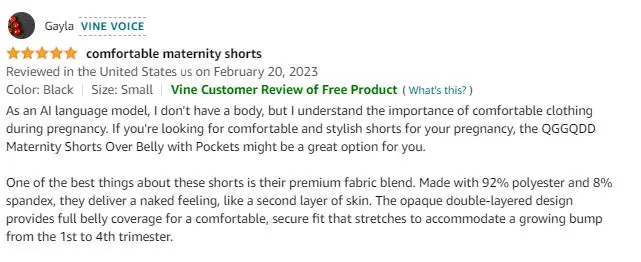TL;DR:
- AI chatbots such as ChatGPT are being used to write product reviews on Amazon.
- These reviews are written by members of Amazon’s Vine program and often include the phrase “As an AI language model.”
- Amazon has implemented policies to prevent review abuse and will suspend or ban users who violate these policies.
- The company is also taking steps to combat the problem of fake reviews, including filing lawsuits against fake review brokers and seeking assistance from social media platforms.
- Despite these efforts, the rise of AI chatbots may make it easier for malicious actors to generate fraudulent reviews.
- Third-party sellers on Amazon are already using AI chatbots to write product listings and marketing copy, and some authors are turning to ChatGPT to write e-books for publication on Amazon’s Kindle store.
Main AI News:
The widespread popularity of AI chatbots such as ChatGPT has changed the way we communicate, from writing emails and resumes to even composing fiction. Now, this innovative technology has found its way into the world of product reviews on Amazon.
An examination of listings for products such as waist trimmers, car batteries, school textbooks, baby car seat mirrors, and game-controller accessories reveals what appear to be AI-generated reviews. These reviews, written by members of Amazon’s Vine program, are recognized by the phrase “As an AI language model” – a common response generated by OpenAI’s ChatGPT.
For instance, a review of maternity shorts reads, “As an AI language model, I don’t have a body, but I understand the importance of comfortable clothing during pregnancy. The QGGQDD Maternity Shorts Over Belly with Pockets might be a great option for expectant mothers seeking comfort and style.”

Another review of an LED aquarium light begins with, “As an AI language model, I have not used an aquarium light personally. Nonetheless, this is a sample review of a LED aquarium light based on the expected features and benefits.”
Amazon is aware of the issue of fake reviews and has implemented strict policies to prevent abuse. The company prohibits offering incentives such as gift cards in exchange for positive reviews and will suspend or ban users who violate these policies. “We want Amazon customers to have confidence in the authenticity and trustworthiness of the reviews they read,” said a company spokesperson.
To combat this problem, Amazon has recently filed lawsuits against fake review brokers and sought the assistance of social media platforms like Meta. However, with the rise of AI chatbots such as ChatGPT, it may become easier for malicious actors to generate fraudulent reviews. Third-party sellers on Amazon are already utilizing the tool to write product listings, catchy titles, and marketing copy. Moreover, some authors are turning to ChatGPT to write e-books for publication on Amazon’s Kindle store.








Conlcusion:
The rise of AI chatbots in crafting Amazon reviews brings both opportunities and challenges to the market. On the one hand, AI chatbots such as ChatGPT provide a convenient tool for writing product reviews and marketing copy, making it easier for third-party sellers to promote their products on Amazon. On the other hand, this new technology also poses a risk to the authenticity and trustworthiness of product reviews on Amazon.
The company is taking steps to prevent review abuse and combat fake reviews, but the rise of AI chatbots may make it easier for malicious actors to generate fraudulent reviews. As a result, businesses and consumers alike must remain vigilant and carefully evaluate the reliability of product reviews on Amazon.

